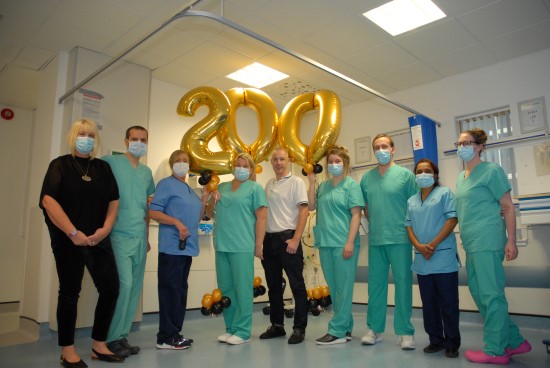Cardiology staff mark double-century of heart procedure
Published: 27/10/2021 01:00Cardiologists at NHS Grampian have completed their 200th TAVI procedure.
The heart valve replacement procedure emerged in recent years as an alternative to traditional open-heart surgery for some patients – ensuring patients, who would have a high risk of complications with open-heart surgery, can be considered for treatment with less invasive TAV,I which usually results in a quicker recovery.
Cardiologists at the north-east health board started the service in 2019.

Dr Ciprian Dospinescu, consultant cardiologist and clinical lead for TAVI, led the rollout of this new service for NHS Grampian.
He said: “It has been about two-and-a-half years and we have set up a great service, we have a fantastic team and we have been able to introduce TAVI as a fairly accessible treatment for patients in our area and also across the North of Scotland as well.
“We started by doing two TAVI cases a day and now we can do two in an afternoon. It helps tackle waiting times with the aim to improve the patient’s quality of life quicker.
“There is still a waiting list but our whole team has become slicker at treating TAVI patients and we try to use the resources we have in an efficient way to get their procedures done.
“The pandemic has had an impact on the TAVI service, however the availability of a less invasive alternative to carry out aortic valve replacement has allowed us to continue to treat patients despite the difficulties faced by the health service.”
Opposed to open heart surgery, the TAVI procedure provides a way to implant a new aortic valve less invasively and without relying on some of the hospital resources which have come under strain during the pandemic.
Cip added: “TAVI can be done without general anaesthetic which means we are able to do the procedures without requiring an anaesthetic team. The vast majority of patients also do not require intensive care, so we are saving bed days in ITU; the procedures are quicker; and patients go home sooner – they tend to spend a day or two in hospital and approximately two-thirds are discharged home after two nights.
“So in some ways it was great we started TAVI here when we did, as having the service running before COVID gave us the option to treat patients during the pandemic.”
Cip said it was “very heartening” for all the cardiac staff to see the patients make “much quicker recoveries” following their TAVI procedures.
He added: “There are of course patients for whom open heart surgery remains the best option and we work closely with our cardiothoracic surgical colleagues to decide who should have TAVI and who needs open heart surgery depending on their clinical circumstances.
“Ultimately having the TAVI service here makes a very good treatment more accessible to our patients. Previously elderly patients had to travel to the central belt to get this procedure – some of them declined treatment because of that.
“The accessibility is now much improved, the service is now established with local expertise and an excellent team, which is greatly beneficial to our North of Scotland patients and worth celebrating.”
